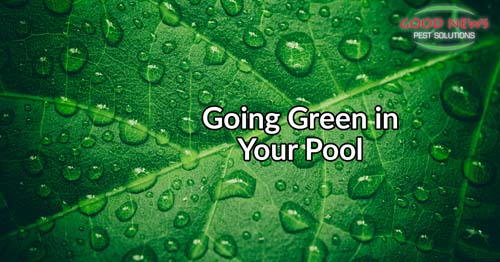
Ways to Go Green in Your Pool
In the midst of the hot summer months, you’re probably not thinking much about going green in your pool. Unless, of course, you’re worried about excessive algae deposits thanks to our near daily rainfall here on Florida’s Gulf Coast. Spending a few minutes now could save you from a potential heart attack a month from now when you get the electric bill. At the very least, the bill will be smaller. Read on for some steps you can take, even while you’re lounging by the pool, and some that you can prepare for that’ll improve your energy efficiency during the off months as well.
Keep the Water Level
One of the biggest ongoing expenses for swimming pools is the need to add water. Covering up a pool with a solar blanket will not only cut down on 97% of evaporated water loss, but will also keep in the heat the pool builds up during the day. That way it takes less energy to heat it back up, if you want or need that. Keeping the pool at a relatively constant temperature also helps with avoiding algae build-up and reduces the need for certain chemicals by 30-60 percent. You’ll want to have an easy way to roll the cover on and off, too. A pool that is covered too often during sunny days will start to build up excess chlorine. Another way to keep your pool topped off is to take advantage of our summer rains. Not just the water that lands in the pool, but for a few dollars, you can install rooftop gutters that drain down into the pool. Be sure to use a debris filter on the end leading to the pool to cut down on leaves and such. Then, when you check the pool filter, clear that too.
Below the Waterline
If you have an older pool, consider paying to install LED lights instead of the older traditional bulbs that used to be used. It’ll cost you $200-500 depending on the system you choose to switch to, but you’ll make that money up in reduced costs within the first couple of years. Make sure you’re using an environmentally-friendly pool filter. Cartridge filters are the easiest to clean and maintain. Sand filters require backwashing to really clean them properly, using thousands of gallons of water a year. Your filters should also be automated. Newer filter systems come with a timer, but you can easily use a standard appliance electrical timer at the outlet to make sure the system runs only 6-12 hours a day. This saves energy and reduces the need for more chemicals as well. And if you’re not using the pool regularly, dial it down to 2 hours a day. Consider making the bottom of the pool darker. The pool will heat up quicker from the sun, and depending on the pebble or stone bottom installed, it can help maintain a constant temperature across the pool longer. Make sure you’re using the right size pool pump. Most pools can be maintained just as well with smaller, high-efficiency pumps, or even one that runs on solar power. Just like the filter, set a timer on the pump so it’s not running when it doesn’t need to. Look into a heat pump pool heater. As long as temperatures are above 45º F, the heat pump pool heater is the best choice for heating pools. The heat pump pool heater captures and circulates heat across the pool instead of just heating everything like an electric or gas pool heater.
Above the Waterline
Of course, the best pool heater is the sun above us. Installing select solar panels on your roof can heat water while generating lower cost electricity for other pool and home needs. The upfront cost can be considerable, but some areas offer rebates for installing solar, and even if they don’t, the power savings will add up quickly. The more you clean your pool yourself the less work the filter and pool vacuum need to do. Getting into the habit of manually sweeping the pool with a long handled net can add life to your pool equipment. In Florida, we’re required to maintain a fence or screen enclosure around our pools. But consider taking this one step further. If you plant shrubbery and trees around the perimeter, you’ll reduce evaporation and heat loss while enhancing the look of your yard. Plus, if you opt for native Xeriscape, you’re reducing your lawn watering costs and augmenting the natural environment.
Testing the Waters
Testing your pool on a consistent basis means less chance of having to shock your pool with chlorine or other heavy chemicals. Maintaining the proper balance uses fewer chemicals and is safer for your family as well. Consider installing an ionizer or a UV light system to reduce chlorine use by 50-80%. Nowadays, you don’t have to settle for a chemically-infused freshwater pool. Consider switching to a more environmentally-friendly salt water pool. The water is gentler to the skin, leaves your skin feeling softer, and feels normal because it’s more like the environment of our mother’s womb. The salt also helps cut down on algae buildup, costing less for maintenance. All-natural is something we love here at Good News Pest Solutions. Years ago, we committed to using only natural, safe pest control solutions, and we’ve never looked back. Ask our customers from Apollo Beach to Bradenton to Port Charlotte and they’ll tell you our solutions are more effective and cost-efficient than the harsh chemicals so many other companies use. If you’d like to learn more, give us a call! Click here for more tips on Going Green around your home!
« Back to BlogProudly Serving
Sun City Center, Ruskin, Palmetto, Parrish, Ellenton, Bradenton, Anna Maria, Holmes Beach, Bradenton Beach, Longboat Key, Lakewood Ranch, University Park, Myakka City, Sarasota, Siesta Key, Osprey, Nokomis, Casey Key, Venice, Englewood, North Port, Port Charlotte, Punta Gorda, Arcadia
Things You Can Do
Pay Your Bill Online
Leave Us a Review
Request a Free* Termite Inspection
Stop Mosquito Bites
Get Rid of Rodents
Get a Termite Damage Warranty
Get Pest Control for Your Attic
Get Pest Control for Your Business Request Prayer
Corporate Address
1080 Enterprise Court, Ste A
North Venice, FL 34275
Call Now: (941) 412-9610
Text: (941) 412-9610
Fax: (941) 412-0080
